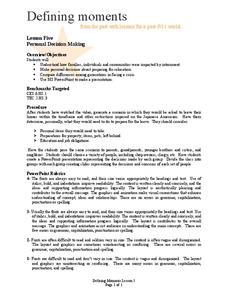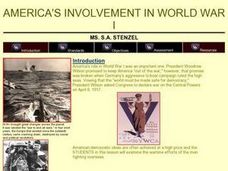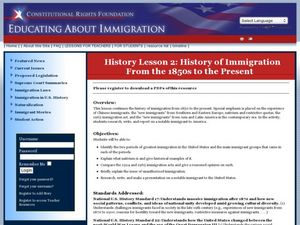Curated OER
The Marshall Plan for Rebuilding Western Europe
Students examine the aftermath of World War II. In this Marshall Plan lesson, students listen to their instructor present a lecture regarding the plan to rebuild Western Europe and its outcome. Students respond to discussion...
Curated OER
U.S. Entry Into WWI
Students identify the reasons why the United States entered World War I. In this world history lesson, students are given a lecture on Woodrow Wilson and analyze documents (specifically, Woodrow Wilson's speeches). Students answer...
Curated OER
My Secret War - The WWII Diary of Madeline Beck: Lesson 2
Fifth graders explore world history by reading historical fiction. In this World War II lesson, 5th graders read the story My Secret War and identify the importance of fiction when analyzing history. Students answer study questions about...
Curated OER
"A Sound of Hammering"
Tenth graders study "A Sound of Hammering," which is a letter written by a former soldier after the Japanese surrender at the end of World War II.
Curated OER
The Jewish Holocaust
Ninth graders research the causes and events of the Jewish holocaust during World War II. They view a video and PowerPoint presentation and take notes, participate in a class discussion about the term "genocide," and take a quiz.
Curated OER
Did WWI Make Your Country Happy or Mad?
For this World War I worksheet, students respond to 5 short answer questions regarding the effects of World War I on different countries. The questions are answered from different country's perspectives.
Curated OER
Studying Japanese Internment with Primary Documents
Eleventh graders view photographs of the Japanese society being interned in camps during World War II in the United States. In groups, they read and discuss Executive Order 9066 and try to determine what group they are trying to focus...
Curated OER
Defining moments: Framing the Problem
Students create a problem framing chart to examine the issues surrounding the decision to inter Japanese Americans during World War II. They respond to a set of questions using perspectives from different parties involved in the decision...
Curated OER
Personal Decision Making
Students create a powerpoint presentation documenting a decision they must make regarding Japanese internment during World War II. Working in groups, students are given scenario regarding internment. Using various resources, including...
Curated OER
Japanese Internment During World War II
Learners identify, describe and discuss the reasons why Japanese-Americans were placed in internment camps and what life was like at these camps. Then they write an unsent letter to a family member on the East Coast describing their...
Curated OER
America's Involvement in World War I
Young scholars investigate online websites on German U-boat naval warfare, conditions in the trenches and the effects of poisonous gases. They write three entries in a diary from different perspectives.
Curated OER
What Are Your Human Rights?: Post World War II and Human Rights
Students define and discuss human rights, make lists of human rights they think everyone deserves, and create class list of ten most important rights. Students then translate formal language of Universal Declaration of Human Rights into...
Curated OER
Women Air Force Service Pilots
Tenth graders evaluate the contributions of female services pilots during World War II. They discuss the service of the women as well as the conditions they confronted. Students compare and contrast the treatment of male and female...
Curated OER
Anti-Vietnam War Movement Lesson
Learners examine reasons why many Americans opposed the Vietnam War. In this world history lesson, students view a Powerpoint of anti-war images and a timeline of events that led to the war. Learners examine speeches made by John Kerry...
Curated OER
Forced Imprisonment WWII
Seventh graders examine Japanese-American internment camps. In this World War II lesson, 7th graders research the details of Japanese-American internment and create digital journals of the experience from the perspectives of internees.
Curated OER
Police Action: The Korean War, 1950-1953
Learners explore why the United States became involved in the war in Korea. They discuss the confict between Truman and MacArthur, culminating in the latter's dismissal from command. They identify on a world map foreign countires...
Curated OER
Ethnic Groups in World War II
Students discuss the contributions of various ethnic groups during World War II prior to visiting the George Bush Gallery of the Pacific War. After the visit, they interview veterans about prejudice during the war or listen to a guesst...
Curated OER
Nationalism and Conflict-Two Fronts, Two Perspectives!
Students examine the major conflicts of the 20th century. After watching a video, they discuss the various types of technology and how they were used in World War I. They watch excerpts from films covering different wars and view them...
Curated OER
The History of the Holocaust From A Personal Perspective
Students research and identify how Holocaust events affected lives of real people who lived in Europe from 1933 through 1945 and after, and create original artwork, poetry, and essays that reflect understanding of Holocaust, and its...
Curated OER
Killing Fields
Students view a television program that explores people's perceptions and expectations in war prior to and after WWI. They discuss the effects of trench warfare and write a journal entry or short oral report reflecting on their...
Curated OER
The War of the Worlds
Young scholars discover the concept of media based on literature. In this War of the Worlds lesson, students read the novel The War of the Worlds by H.G. Wells and listen to the 1938 radio broadcast adaptation by Orson Welles. Young...
Curated OER
Sadako
Learners engage in a literature study in order to comprehend the times of the Japanese during World War II. Specifically they look at the life of a little girl named Sadako in Hiroshima and how she overcomes her deadly disease of Leukemia.
Curated OER
History of Immigration From the 1850's to the Present
Eleventh graders study the history of immigration from 1850 to the present. For this American History lesson, 11th graders compare the 1924 and 1965 immigration acts and give a reasoned opinion on each. Students research,...
Curated OER
A Land of Milk and Honey
Ninth graders examine the term multiculturalism. In this Cross Curricular History and Social Studies lesson, 9th graders analyze a video clip. Students investigate the requirements for becoming a citizen in Australia.























